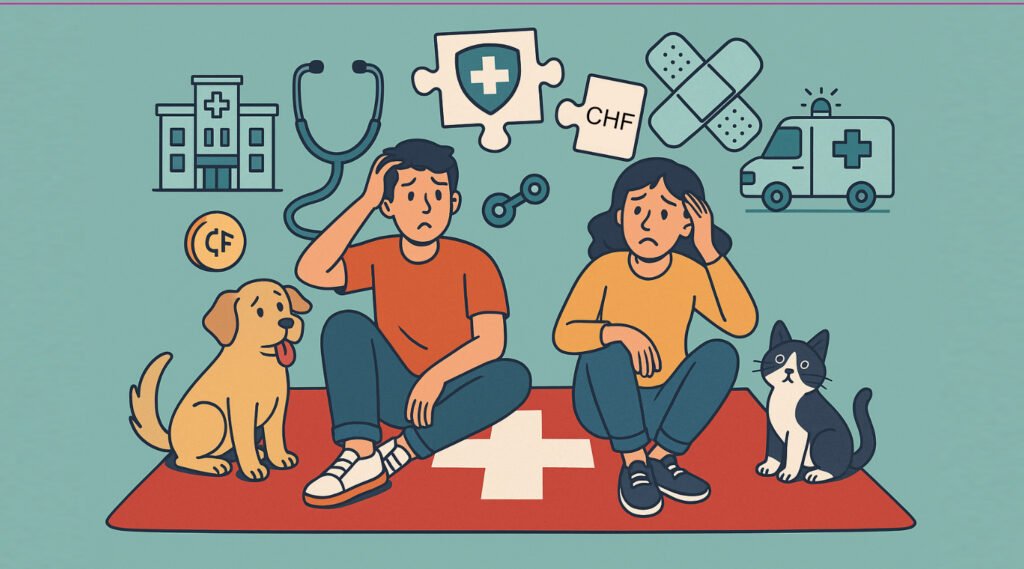Understanding Health Insurance in Switzerland
Basic Health insurance is mandatory — but understanding it shouldn’t be a mystery.
Whether you’ve just moved to Switzerland or have been here for years, health insurance can feel confusing and expensive.
Unlike many countries, Switzerland doesn’t offer a public health system in the traditional sense. Instead, everyone must take out private insurance — with a policy that complies with federal law.
In this article, we’ll try to break down what we believe are the essentials; from how the system is structured to what’s actually covered, this is the starting point for making more informed (and financially smart) decisions.
So How Does the Swiss System Work?
Health insurance in Switzerland is mandatory for all residents. The law requires you to take out a basic health insurance policy (called Grundversicherung or L’assurance de base) within 3 months of registering your residence.
But here’s the twist: although coverage is mandatory, it is provided entirely by private insurance companies. These companies are heavily regulated, but each sets its own premiums and may offer different service models.
A Few Key Terms to Know
Understanding a few basic terms can make things a lot easier:
- Franchise (Deductible): The fixed annual amount you pay before insurance begins covering costs. You choose this amount (e.g. CHF 300, 2’500).
- Selbstbehalt (Copayment): After reaching your deductible, you pay 10% of further costs up to a limit of CHF 700/year.
- Premium: The monthly amount you pay, regardless of how much care you use.
- Accident Coverage: Usually covered by your employer. If you’re not employed, you must include this in your insurance.
- Supplementary Insurance (Zusatzversicherung): Optional add-ons for things like private hospitals, dental, or alternative treatments.
What’s Covered – And What Isn’t
Basic insurance must cover all medically necessary treatments, including:
- Doctor visits
- Hospital stays in the general ward
- Emergency care
- Prescription drugs
- Maternity and childbirth
Important: These services are only reimbursed after you’ve paid your annual deductible (Franchise). Once your deductible is reached, you still contribute 10% (the copayment, up to CHF 700/year for adults). So even though the care is “covered,” you may still pay out of pocket — especially with a high deductible.
What’s not covered includes:
- Dental treatment (except trauma cases)
- Glasses/contact lenses
- Private hospital rooms
- International medical coverage
These require supplementary insurance, which is optional and separately priced.
How It Affects Your Finances
Premiums are not linked to income, but instead vary by:
- Canton of residence
- Age group
- Chosen deductible (franchise)
- Insurance model (standard, HMO, Telmed, etc.)
Choosing a higher deductible can lower your monthly premium — but it means you’ll pay more out-of-pocket if you need treatment.
Health insurance premiums are often tax-deductible, depending on your canton. We’ll cover this in more detail in a later section.
What If You Don’t Choose in Time?
If you don’t choose a provider within 3 months of arrival or life change (e.g. moving, losing employer coverage), a canton may assign one to you — often at a higher premium. You’ll still be billed retroactively from the date your obligation began.
One System, Many Needs
A student on a tight budget and a family with young children won’t have the same needs. In future articles, we’ll look at what to consider depending on your life situation — and how to choose the plan that fits you.
What’s Next: Where to Go From Here
To compare available providers and monthly premiums in your canton, use the official government comparison tool: www.priminfo.admin.ch
The site is only available in Switzerland’s official languages DE, FR and IT.
We recommend using this tool as a starting point before speaking with insurers or brokers.
